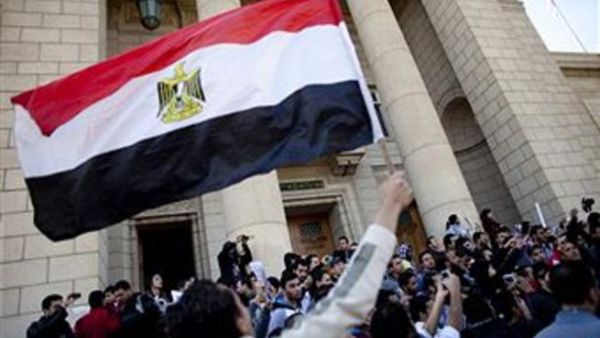Is revolution bad for the economy? Tourism is down, the Gulf states refrain from sending Egypt money, the future of US-aid is unclear and attracting foreign investors won’t happen until it’s clear which direction Egypt will follow. And it’s not only the future that looks indecipherable, the past also is. Observers such as the World Bank’s president link the protests that triggered the Arab spring with high inflation – and thus bad policy – while others blamed Mubarak of sacrificing everything – including civil rights – for economic growth. Tarek H. Selim, of the American University in Cairo’s Economics Department, may have the answer.
An economic policy that was doomed to fail
Tarek’s clear-sighted analysis points out that while the problems remain plentiful, the revolution might also bring hope for some of Egypt’s most inextricable problems. Egypt’s economy wasn’t doing well. The cost of living in Egypt increased at a rate of 9 percent – officially, in reality it’s up to 14 percent – while the average income or BNP per capita only increased at a rate of five percent. The average Egyptian was thus only get poorer. Moreover, while Gamal Mubarak’s friends were probably enjoying a higher growth, those farming along the Nile banks probably weren’t.
The regime officially tried to contain inflation, but in reality wasn’t, Tarek explains. It simply couldn’t, because it was already devoting all its reserves to stabilize the exchange rate. If this exchange rate – the value of the Egyptian pound against the American dollar – would further decline, Egypt’s food prices would skyrocket. And yet the inflation was the fault of the regime, but not of its macro-economic policy. Mubarak’s regime was characterized by it’s cartels who held huge market power through their monopolies. Some of them had a monopoly over food-imports, of wheat for example, which creates higher prices and inflation. And these cartels were powerful and well protected. In an earlier interview the Muslim brotherhood explained how their proposal to decrease wheat-imports, resulted in having the guy behind it jailed, for not other reason than to secure the profits of the cartels. This is something the revolution could change. Only Egypt’s citizens can tear these monopolies down, “you need less corruption, and it is the citizens who will have to exercise this. Just having a central bank which tries to contain inflation, has proven not be successful,” as Tarek puts it. Sometimes subsidies are blamed for inflation, but he doesn’t agree; “They contain inflation. Research shows that if the subsidies would be lifted, inflation would rise with an additional 10 percent.”
The sources of inflation are to blame, and these are all linked with Egypt’s major problems; corruption, monopoly and inequity. He continues: “All of these are chronic problems linked to the economy. To contain inflation you need foreign investments, and for this you need a very attractive investment environment.”
A cultural transformation is most needed
A lot of people also emphasize that Egypt should decentralize, and he agrees. But now, one must wonder how Egypt will be able to put the pieces of this puzzle together, and reform everything. And don’t you always have people with different agendas in charge?
Luckily Tarek puts the importance of all these economic issue in perspective with a story from Esko Aho, the former Finish Prime Minister. Apparently, the perestroika caused both the Finish and Russian economy to fall into a depression. A lot of Finland’s economy depended on trade with the Russians and both were centralized socialist counties. Tarek paraphrases Esko Aho; “People were proposing strategies to reform the state and attract investment all the time, but in the end it was the perception of the government that mattered. If the government would knock on the door in Finland, people would say great we have help, while in Russia they would be very upset. And this makes mistrust, corruption and bureaucracy very important. Unfortunately, this is how Egypt is today, the government should be available for help, not only to monitor or collect bribes.” When I raise the issue of the informal economy, he minimizes the impact of formalizing it.
“It’s not important what government collects, but what society collects. If you try to fit them in an inefficient system, they will also turn inefficient. In the end, we first have to work on the trust issue.” He also worked on Islamic Finance, and comments, “the idea of complementing excess capital with shortage capital, labor with capital and effort with money is very interesting. There could be a future for such a system in Egypt, but not as a monopoly. The traders also have good connections with the Gulf or Asia for capital.”, but then he quickly minimizes it again: “In theory it is nice, but in practice it all tends to be commercial banking.”
Tarek keeps on stressing the importance of what he calls a cultural transformation. And he looks at China for inspiration: “Mao laid the foundation for China’s economic transformation by sending ten thousand students abroad every year. They weren’t obliged to work for the government when they came back. Instead he set up a fund for them to set up initiatives with the fresh ideas they gathered. He just wanted them to return. It’s similar to what Mohamed Ali did by sending people like Rifa’a el-Tahtawi to Europe. Until now, we had this on a smaller scale, but to have a cultural transformation, we should do it on a mega scale. And it isn’t that expensive, if we want to send ten thousand people, it wouldn’t cost us more than 500 million dollar a year, which is less than 1 percent of our GDP.”








